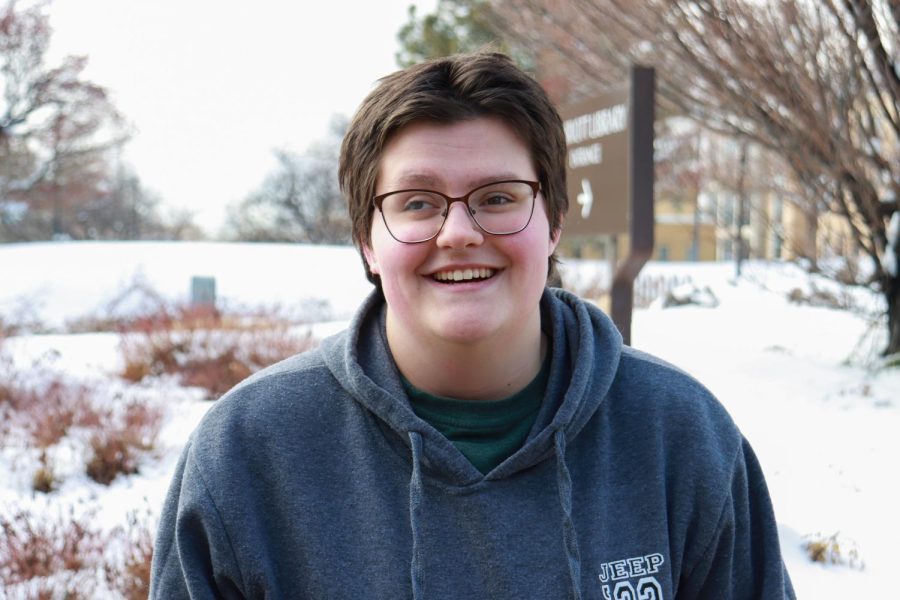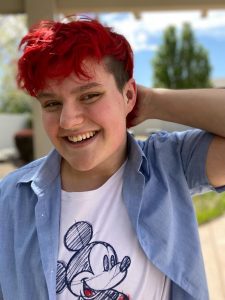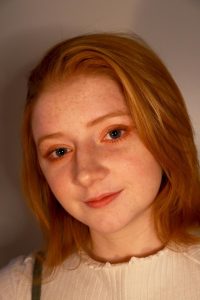Fuller: So Long, and Thanks for All the Stories
Whit Fuller, arts wrtier of the Daily Utah Chronicle, poses for a photo in front of the J. Willard Marriott Library on the University of Utah campus in Salt Lake City on March 27, 2023. (Photo by Sarah Karr | The Daily Utah Chronicle)
May 3, 2023
If someone had told me three years ago that I would have spent three years of my college career writing for the university’s student newspaper, I would have cried tears of joy. I now say goodbye to a wonderful experience and to the personal, artistic and journalistic aspects of myself.
When I started on the arts desk in the fall of 2020, the first piece I wrote for the Daily Utah Chronicle was an interview and album review for Silver Cup, a Utah-based sibling trio that writes catchy tunes about growing up in the state. That first interview over the phone was nerve-wracking. I dialed and couldn’t stop myself from fumbling as I said my name, asked questions and tried to sound like I knew anything about music.
While Silver Cup still makes incredible music that serves Utah nostalgia, I’ve become a fuller and more realized version of myself in a way similar to their evolution and growth. The last story I wrote for the Chrony before coming out as transgender was about the UMFA exhibit “Confluence” — which examined relationships to water on a personal and communal level. Just a week later, I interviewed self-proclaimed “queer quartet” and band Fleece about their record “Stunning & Atrocious.” I was nowhere near as shaky on that phone call as I had been on my first.
It felt good to say my chosen name out loud for the first time on that call — to settle into myself and be affirmed by the kinds of artists and musicians who I had grown up admiring and wanting to sit down with just like this. It held up a mirror to my first interview over a year earlier with Silver Cup. The person on the other end was a more confident writer and wasn’t afraid to write what he wanted or go after the bigger stories that seemed difficult. However, not all of my stories were hard to write due to professional or journalistic format. It was a review of Netflix’s “Chilling Adventures of Sabrina” and its transgender character, Theo, that daunted me.
I felt unqualified to speak on the show’s representation despite having been out for a few months and writing for the Chrony for a year. I binge-watched the entire series in just a few weeks and spent hours researching Lachlan Watson, the actor who themself is nonbinary and trans and brought Theo to life in the show. That same story that I had spent so long working on went on to earn me second place in the SPJ Utah Chapter’s Headliners contest of 2022 and has resulted in emails and messages from both strangers and friends about the impact of trans topics discussed by trans journalists.
I learned about the award when Glen Feighery, a beloved professor and mentor who was my introduction to the communication department, sent me an email to congratulate me on the honor. Feighery himself had been a member of the Utah Headliners chapter of SPJ board. Feighery saw me through the beginnings of my time at the Chrony. His Intro to News Writing course taught me the basics and gave me the AP stylebook that has become the foundation of my work in other courses.
But more importantly, Feighery showed me what a career in journalism looks like when a journalist allows themselves to be human and kind above everything else. He started out at DePauw University in Greencastle, Indiana. His plan was to become a lawyer and follow in the footsteps of his father and grandfather with a pre-law major and end goal of becoming the general counsel at their same company. But he found himself switching to history when he realized that DePauw didn’t have a pre-law major and math was proving more difficult than he’d initially thought. Then came the interest in journalism. He had written for his high school newspaper before graduation. However, it was a conversation with a neighbor in the dorms, Richard Steele — the imposing echo of poet Wallace Stevens — who got Feighery on track.
“At one point he said to me, ‘I see you as a columnist, a newspaper columnist someday,’” Feighery said. “So he was the person who got me thinking of that. I had worked on my high school paper but then, I think in no small part because of my neighbor Richard, I went and worked for the campus paper.”
He joined the paper and worked his way up from feature writer to Editor-in-Chief over several semesters. After two internships and a few terms with a suburban life newspaper in Ohio, Feighery found his way back to academia for a final haul before becoming the professor he is today. Feighery highlighted the impression of a particular student, Steve Gehrke.
Formerly a Tribune journalist and the Editor-in-Chief of the Chrony in 2006, Gehrke did some of the coverage of the 2007 Trolley Square Shooting. Sulejman Talovic had shot, wounded and killed a number of people in Trolley Square. As an assignment reporter, Gehrke was tasked with interviewing people in the hospital following the shooting, and a day later with staking out the home of the shooter.
A neighbor approached and asked Gehrke to deliver money that neighbors of the Talovic’s had collected for the family. Gehrke agreed and when Sulejman’s father Suljo arrived at the home, he handed him the money and offered to help him with whatever he could before the possibility of sitting down for an interview.
“I can’t say I was proud of Steve because he did it — like, that’s who he was,” Feighery said. “But to me, that’s what we should all aspire to. Because if you ever forget your humanity, then why are you a journalist? To me, it summarizes what I’m trying to do. If I had any part of that, maybe I did maybe I didn’t, I still say it came from him, right? And if I’m doing that even just little bits, that’s what makes me happiest. I could publish a book tomorrow, I don’t think it would mean as much. That’s how I feel. That’s why I changed careers. I didn’t change careers to sit in an office with the door closed thinking deep thoughts because A) I’m not very good at deep thoughts and B) it’s just kind of a game. I prefer dealing with actual humans.”
I want to thank professors like Feighery and my three sets of editors during my time at the Chrony for teaching me to be human and to write well — Oakley and Parker, Hannah and Frank, and Avery and Luke.
Thanks to Kody Carbone and Natalie Colby for supporting me as I went through personal and professional transitions with the Chrony. The two of you helped me come out and live fully, which impacted my writing more than you know.
I am not the same person in many ways, I’ve come out as transgender and declared a communication major in journalism while with the Chrony, but at the heart of it, I’m still the same teenager who believes that art and human connection make life worth living and journalism worth the work.









